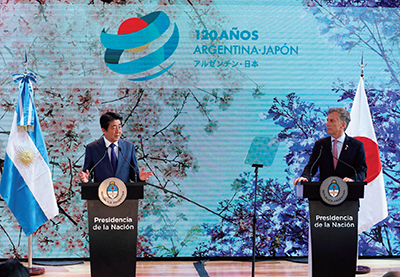Diplomatic Bluebook 2019
Chapter 2
Japan's Foreign Policy that Takes a Panoramic Perspective of the World Map
Section 3 Latin America and the Caribbean
1 Overview
(1) Situations in Latin America and the Caribbean
The Latin American and Caribbean (hereafter referred to as “LAC”) region mostly consists of countries that share values such as democracy, the rule of law, and human rights, and has a population of about 640 million and a GDP of about 5.6 trillion US dollars. It is a major production area for natural resources such as minerals and energy as well as food, and has considerable economic potential such as its rapidly growing large market. In 2018, the LAC economy was overall supported by steady increases in domestic demand, and maintained slow growth. In addition, there was a trend of industrial added value through participation in the global value chain (international division of labor in the manufacturing industry), centered on countries along the Pacific Ocean. On the other hand, Argentina's currency value plunged from the end of April, and the Government of Argentina requested support from the International Monetary Fund (IMF).
On the political front, presidential elections were held in six countries in 2018. Amidst a focus on issues of corruption and public security, candidates without a basis in traditional political parties secured victories in Mexico and Brazil. On the other hand, in Venezuela, where confrontations are continuing between the administration and the opposition parties, a presidential election was held in May amidst a boycott by the main opposition parties and it was announced that President Maduro was reelected. The G7 and many countries in the LAC region have shown strong doubts about the legitimacy of the election. In addition, in the LAC region, there are communities of Japanese immigrants and descendants (the Nikkei community) numbering about 2.13 million, about 60% of the whole world's Nikkei population. This is a bond that is unique to Japan. Contributions by Nikkei people to the local community for more than 100 years have established a traditional affinity toward Japan. On the other hand, due to generations change of the Nikkei community through more than 100 years since the beginning of migration, there is an increase in the young generation with a weak connection to Japan.
(2) Japanese Diplomacy towards Latin America and the Caribbean Countries
Japan's diplomacy toward the LAC region has developed under the guiding principle of the three “Juntos” (“progress together,” “lead together,” and “inspire together”) announced by Prime Minister Abe in 2014.
In 2018, in addition to Prime Minister Abe's visits to three Latin American countries, there were over 70 visits to countries in the LAC region by officials from MOFA and other ministries and agencies including the two visits to the region by Foreign Minister Kono. On these occasions, it has been confirmed to resolve various matters in the international arena together with LAC countries based on shared fundamental values.
On the economic front, supply chain connections are strengthening, including by doubling the number of Japanese companies operating in the LAC region over five years, and Japan is working to promote free trade together with LAC countries including through the Comprehensive and Progressive Agreement for Trans-Pacific Partnership (TPP11 Agreement), which Mexico, Peru, and Chile are participating in.
In the LAC region, as countries will “graduate” from the status of recipient countries by achieving economic growth, Japan is promoting triangular cooperation with these countries. On the other hand, Japan is developing cooperation in line with other countries' needs in fields where continuous support is required, including responses to climate change and natural disasters.
During his visit to Argentina in December, Prime Minister Abe synthesized such results and announced the concept of the Initiative to Enhance Connectivity between Japan and Latin America and the Caribbean to show the direction of further enhanced cooperation within Japan-LAC relations. The pillars of this concept are “enhancing connectivity of economies” pursuing free and open economic systems through the promotion of global value chains and quality infrastructure, “enhancing connectivity of values” that involves jointly preserving rules-based multilateralism through political dialogue, and “enhancing connectivity of wisdom” to strive to achieve the Sustainable Development Goals (SDGs) together through exporting innovation.
 Closing Ceremony for the 120th Anniversary of the Establishment of Diplomatic Relations between Japan and Argentina (December 1, Buenos Aires, Argentina; Photo: Cabinet Public Relations Office)
Closing Ceremony for the 120th Anniversary of the Establishment of Diplomatic Relations between Japan and Argentina (December 1, Buenos Aires, Argentina; Photo: Cabinet Public Relations Office)